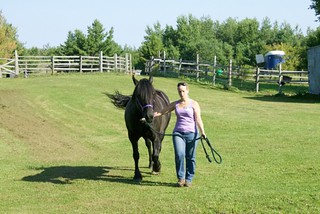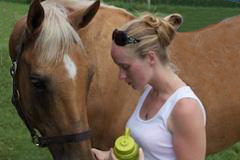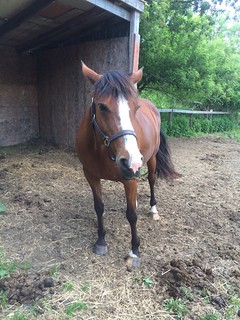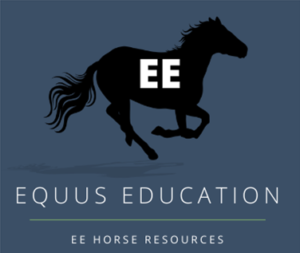How much of your day/week is related to horses?
All of it! No, seriously. Just about everything I do is horse-related. I spend approximately 20-25 hours a week teaching, another 10-15 hours training and/or riding, followed by a fun-filled 15-20 hours of paperwork. Let’s not forget the 1-2 hours a day of mucking, turn in and out, and general barn maintenance.

What is it exactly that you do?
That’s a bit of a complicated question. The easy answer is I’m an instructor. The complicated answer is I work with clients with special needs to teach them how to ride and/or how to safely handle horses.
I also work with horse owners and teach them equine first aid. I co-facilitate equine assisted learning clinics to teach both horsey and non-horsey people how to set healthy boundaries, how to be more mindful and present in the moment, and how to be more confident in their lives.
All of the above is done through my business, The Equine Connection Therapeutic Riding & Learning Centre, so I also do a lot of indirectly horse-related things that involve finances, marketing, customer relations, and developing new training programs for my horses and for clients.

In this field of work, is it possible to be a full time professional and earning a liveable income?
It’s possible for sure but it takes a lot of work, time, effort, and money, and a bit of luck doesn’t hurt! There are established centres in most countries where you can work instead of establishing your own centre like I did.
Most people involved in therapeutic riding or equine assisted learning do it as a part-time job, which is their passion. I’m one of the few fortunate people who is able to do it (mostly) full-time with some equine-related marketing contracts on the side.
What are the general steps taken to be employed in such a role?
Start by volunteering at a centre. Get as much experience as you can working with horses and people with special needs. Take an opportunity you can get to handle horses from the ground or ride. Audit riding clinics if you can’t afford to participate in them.
Take advantage of free or cheap online courses to learn more about horse behaviour and handling or about specific disorders and diseases that are treated using equine therapy. Be hungry for information and helpful! The more present and helpful you are at a centre, the more likely you are to get a job in this field.

Favourite horse memory?
I don’t know if I can pick just one. I have many happy memories of pulling up a chair and sitting in the paddock, just watching the herd. I’d have to say that my most recent favourite horse memory was when a client of mine cantered for the first time. It was her last lesson for the year, and she’d just asked my horse to trot for about the 5th time that lesson. She had ridden before but had lost all of her confidence.
She’d been working on position at the trot with me for a few weeks and when she asked my horse Noble to trot for the 5th time, he decided it was time for her to be more confident. He only took about 7 canter strides, but the huge smile on her face was priceless.
She’d always been a bit of a nervous rider and seemed to lack confidence in herself, but after that short canter, she carried her head high and gave him the biggest hug and kiss I’d ever seen. Another trainer might have viewed what he did as misbehaving, but I know that he did it for her. He knew what she needed and took it upon him to get the job done.
Future goals?
I have so many it’s difficult to narrow them down! Mainly, I want to keep expanding my programming so that it’s available for more kids and families in need.
Best of all, this means getting another horse! I’ve been lucky enough to have three amazing therapy horses so far, in addition to a handful that I lease by the hour for lessons. With a lot more hard work and a bit more luck, I’m hoping that my herd will grow again soon. My ultimate goal is for this to be my only full-time job but I’m still a bit away from that happening.
Best thing about your sport/profession?
I get the best of two worlds. I get to spend time with my horses on a regular basis and share them with all sorts of different people. I get to meet new people all the time and teach them about the joy of just being with horses.
I also get to help people with getting stronger physically and mentally through the use of horses. My clients learn new things about themselves from my horses and I get to learn new things from them.
“I would travel only by horse, if I had the choice.” – Linda McCartney

Leave a Reply